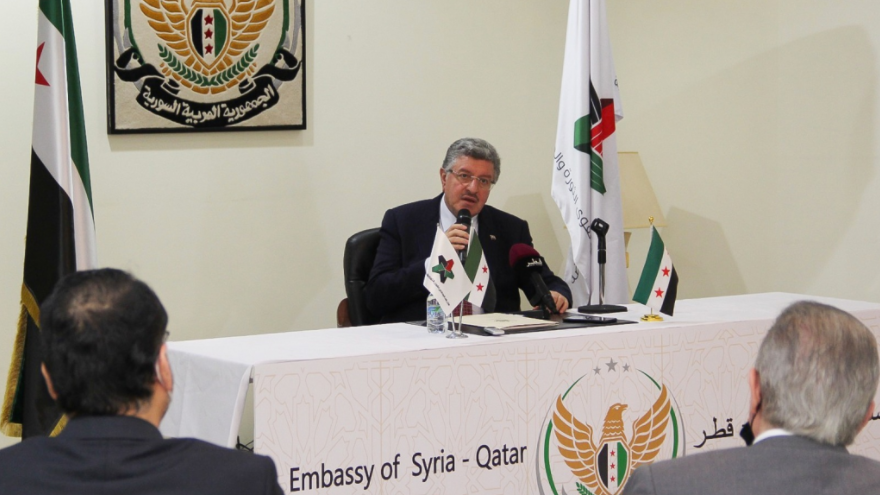The two-day “Whither Syria?” seminar, which was held on Sunday at the invitation of dissident Syrian Prime Minister, Riad Hijab, in Doha, issued 17 recommendations to the revolution and opposition forces. The meeting held in Qatar brought together major Syrian opposition figures.
The recommendations, followed by Riad Hijab, emphasized the preservation of the Syrian territory’s unity, state sovereignty, and independence. They rejected all calls for partition and confirmed adherence to the Syrian national identity and the establishment of a democratic system.
The recommendations stressed, “restructuring the institutions of the revolutionary and opposition forces, and improving their performance in order to achieve the right and legitimate demands of the Syrian people and represent them efficiently and professionally. They also ensure the independence of their national decision, and qualify them to be the political bearer who enjoys the confidence and support of the people.”
These recommendations emphasized the development and employment of expertise available in Syria and abroad, benefiting from consultations provided by national think tanks, and supporting the pivotal roles played by Syrian communities in countries of asylum and displacement. They talked about strengthening the role of women and young people in national activities and ensuring their representation in other areas of public affairs, including the institutions of the revolutionary and opposition forces.
“We need to work on the formulation of an inclusive national discourse and support the efforts of Syrian media organizations in what contributes to the fight against hate speech and discrimination, and emphasizes the Syrian issue,” according to the recommendations.
The symposium’s recommendations pointed to strengthening communication between the various forces of the revolution and the opposition, with the aim of adopting a comprehensive action plan that will keep pace with the transformations of this stage and address the challenges resulting from it. They drew attention to providing effective solutions to alleviate the suffering of Syrians, stop systematic violations against them, and demand the release of detainees, their compensation, disclosure of the forcibly disappeared, and knowledge of their fate.
With regard to the crimes committed by the regime, the recommendations stressed “intensifying efforts to raise awareness of violations and crimes committed by the Assad regime, the risks of impunity and the absence of the rule of law. They affirmed its loss of legitimacy and eligibility to govern the country, and called for deepening its isolation and clarifying the humanitarian and moral consequences of attempts to bring it back, including its return to the Arab League.”
Read Also: Syrian Opposition Makes New Bid to Unite Against Assad
The recommendations confirmed the right demands of the Syrian people and their quest for freedom and dignity and their right to a political transition, the peaceful transfer of power, and respect for their ethnic compositions, including Arabs, Kurds, Turkmen, Chaldeans, and Assyrians.”
The recommendations warned of the importance of “uniting efforts to achieve a political transition in accordance with UN resolutions, ending the system of corruption and tyranny that governs Syria illegally, and emphasizing that its survival means continuing the suffering of Syrians. Some of these sufferings include: promoting instability in the region, creating further unrest within Syrian society, adversely affecting international security and peace, the continued presence of ISIS and other terrorists, sectarian and cross-border separatist groups, such as the PKK, increased risks of dividing the country, and increasing threats to Iran’s penetration in the Syrian affairs.”
The symposium’s recommendations called for “adherence to the political process through the Geneva process, and commitment to the reference of relevant UN resolutions, including the Geneva Statement (1), Resolution 2118 and its second annex, and the resolutions of the United Nations General Assembly, starting with Resolution 262/67, and the subsequent resolutions concerning the human rights situation in Syria, Security Council Resolution 2254. These come in addition to resolutions calling for achieving the demands of the Syrian people, respecting their desire for political transition, as a comprehensive and unified political process, and calling on the international community to work hard and effectively to reach a political solution through a transitional governing body with full executive powers, rejection of the normalization project and any other attempts to rehabilitate the regime despite its crimes, and not allowing sidetracks to obstruct the implementation of these resolutions.
The recommendations also stressed the rejection of terrorism and extremism, whether linked to States, organizations, or individuals, and refused to use its fight as a pretext to undermine the aspirations of the Syrian people for freedom and independence.
They called for action to ensure the access of humanitarian aid across the border, and not to politicize it. They reject attempts by the Assad regime and its supporters to monopolize aid delivery and mobilize international efforts to improve the situation of refugees and displaced persons.
They also called for intensified efforts to develop areas of control by the revolutionary and opposition forces, gradually, until the rest of Syria’s territory is restored and liberated from tyranny.
The seminar’s recommendations warned against attempts by the regime and its allies to employ the suffering of Syrians in order to bring in external funds under the slogan of “reconstruction” and “early recovery”. This, in fact, aims to share the country’s wealth by some greedy forces, divide it into areas of influence among themselves, finance institutions of repression and demographic change, enrich war dealers and symbols of corruption, and emphasize the need to link reconstruction to achieving a just political solution in accordance with relevant UN resolutions.
This article was translated and edited by The Syrian Observer. The Syrian Observer has not verified the content of this story. Responsibility for the information and views set out in this article lies entirely with the author.


